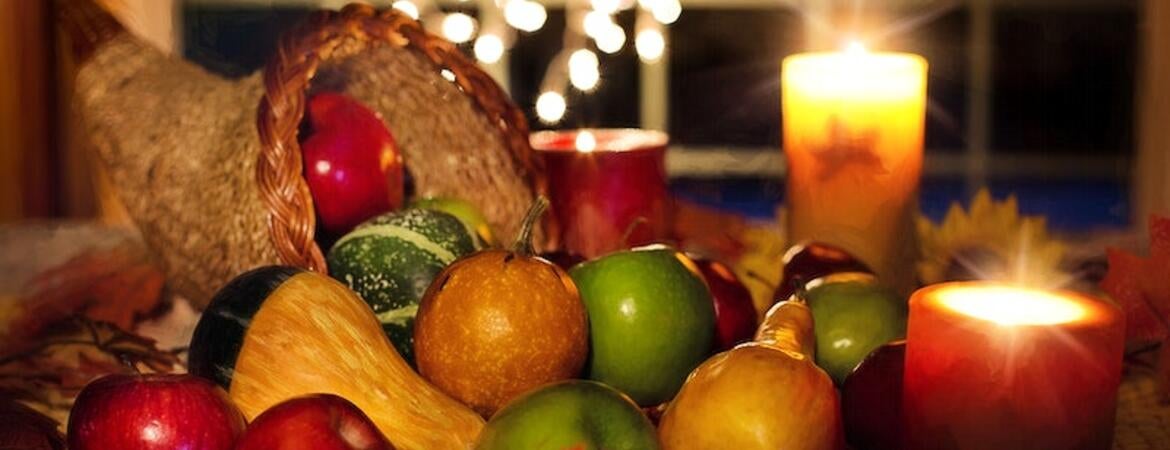Supporting Graduate Students' Academic and Professional Success

Thanksgiving is just around the corner! First of all, if you haven’t read Matt Arthur’s Thanksgiving blog from last year, I highly recommend it. For this Thanksgiving, though, I thought I’d share some thoughts on what it means to me personally to be thankful and to give thanks.
I still speak Chinese regularly at home, so the English words thanks, thankful, and thanksgiving are nuanced by how I understand and use the Chinese equivalents to these words. A common phrase used to express thanks in Chinese is xiè xiè (谢谢). It’s said in most situations in which you would give a courteous “thank you” after a small favor or some kind of service is done. It is also common to hear someone say “many thanks” or duō xiè (多谢) to elevate their gratefulness above the average “thanks”. A deeper, more heartfelt thanks is expressed with the phrase gǎn xiè (感谢), which means to ‘feel thanks’, and you can see the Chinese character for heart (心, xīn) at the base of the character 感 (gǎn) which is used when speaking about feelings.
The Chinese phrase used for thankful and thanksgiving is different still. It is gǎn ēn (感恩) and it has to do with the posture of one’s heart, the seat of thankfulness and thanksgiving. As already mentioned, the character 感 (gǎn) represents feelings or emotions and has ‘heart’ in the lower half of the character. You will, however, also see the heart as the foundation of the phrase’s second character, 恩 (ēn), which represents favor and kindness, but is most commonly translated to mean what in English is termed grace. Thanksgiving, the holiday, is in fact translated into Chinese as gǎn ēn jié (感恩节) – a day of the feeling of kindness received, a day of feeling grace. In this sense, I am giving thanks because something good was done for me or to me… but it didn’t have to be so.
The Pilgrims, who we attribute to having celebrated the first Thanksgiving in the early 1600s, saw grace as unmerited favor. Harsh weather and sickness must have made beginning a new life in the New World challenging if not miserable for the Pilgrims. So, when there was a plentiful harvest and peace with their neighbors, the Pilgrims gave thanks and celebrated with a feast. They certainly would have been justified in my opinion to feel they deserve a plentiful harvest from God after all of the hardship and loss they endured, but they instead postured their heart in the spirit of thanksgiving - 感恩.
Am I ever obligated to be thankful or give thanks? When I give a merchant money for some goods that I’m purchasing, do I need to be thankful? I mean, you’re supposed to give me what I purchase if I give you the right amount of money for it, right? Why should I thank you for what is a legitimate and fair business transaction? If I practice guitar twenty hours a day and play an awesome rendition of Eddie Van Halen’s Eruption riff in front of thousands, the crowd had better give me a standing ovation and shower me with praises, right? Still, we wouldn’t be surprised to see the buyer and the guitar player respond with thanks to the merchant and to the audience.
[Image Description: Eddie Van Halen rocking on his guitar on stage.]
Pictured: Eddie Van Halen being… his awesome self.
We say “thank you” because relationships matter to us, even in our modern individualistic society. Here is the late Roger Scruton:
“… First-person privilege is the foundation of personal relations. In addressing you I am summoning your first-person awareness into the sphere of mine, so to speak. This enables me to discard scientific investigation, psychological theorizing, and the search for hidden motives and to engage with you directly… We stand before each other as in a special way in charge of ourselves, our sincere first-person statements being uniquely authoritative in the revelation of what we think, feel and do.”
When I give thanks, it is in the same way that I give love. No one can force me to love them, and no one can force me to thank them. It is within my authority to say “I love you”, and it is within my authority to say “thank you”. Here is Scruton again:
“Hence the word you does not, as a rule, describe the other person; it summons him or her into your presence, and this summons is paid for by a reciprocal response. You make yourself available to others in the words that call them to account to you. This would not be possible without the first-person awareness that comes to us with the use of I; but that use would in turn not be possible without the dialogue through which we fit together in communities of mutual interest.”
When there’s a lot of good being given, there ought to be a lot of thanks being given in response. And there is. Being thankful is surely evidence that good things are happening, but more significantly it is evidence that we live in a society where there is kindness and grace. Have a Happy Thanksgiving, and “thank you” for your time.
[Image Description: A Happy Thanksgiving greeting card swings in and fall leaves fall onto it.]
Pictured: Have a Happy Thanksgiving!
References
Scruton, Roger. On Human Nature. Princeton, NJ: Princeton University Press, 2017.